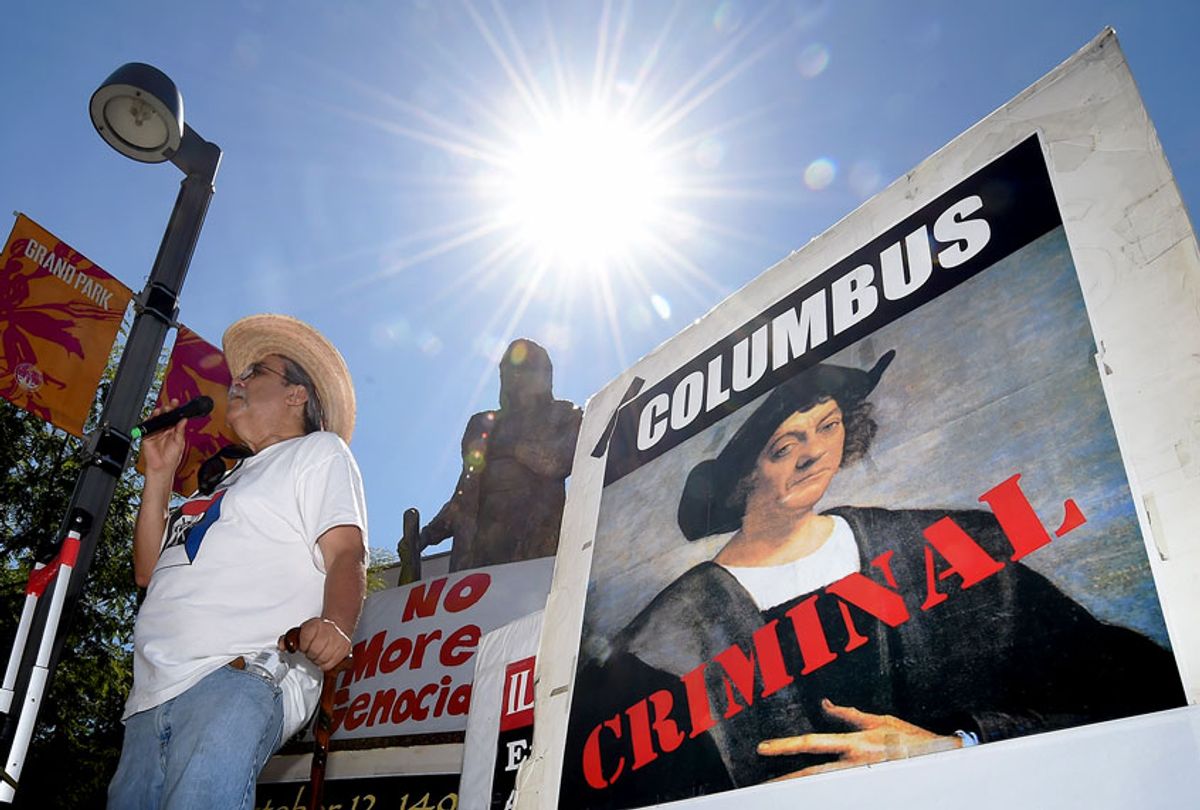There are many good reasons as to why Columbus Day is such a controversial holiday. Like Andrew Jackson, Christopher Columbus is a historical figure who is celebrated as a mythical hero in the U.S. in spite of his genocidal, racist and pro-slavery legacy. As a result, a movement exists to replace the national holiday known as Columbus Day with Indigenous Peoples' Day.
Here is the truth about Columbus Day, explained:
1. Christopher Columbus enslaved the Taínos he encountered in the present-day Bahamas.
When Columbus "discovered" the American continents in 1492 — millions lived there long before Europeans learned of their existence — he encountered a civilization of people known as the Taínos. By his own description, they were curious and friendly, eager to help the new group of people who had landed on their shores. Over time, Columbus enslaved and exploited them, thereby establishing a precedent wherein Europeans would come to the American continents, exploit natives and steal their land. His actions also laid the foundations for the Europeans to introduce African slavery to the American continents, and Columbus is known to have had an African slave with him on his so-called voyages of discovery.
2. Columbus was also a tyrant, generally speaking.
After becoming governor and viceroy of the Indies, Columbus let the power to go to his head, becoming a brutal autocrat who was eventually loathed by his own followers. When one man was caught stealing corn, Columbus responded by having his nose and ears cut off before selling him into slavery. When a woman claimed that Columbus was of lowly birth, his brother Bartolomé cut out her tongue, stripped her naked and had her paraded around the colony on the back of a mule. And these are just two examples of many. Eventually, the Spanish monarchs realized that Columbus had become power mad and ordered him and his brothers to return to Spain. He never regained his power, although his freedom was eventually restored.
3. Columbus Day was established to honor Italian Americans — but they deserve better.
When Italians first began immigrating to the U.S. in large numbers in the 19th Century, they faced severe discrimination and — quite often — violence. As a result, President Benjamin Harrison, who was an under-appreciated liberal, designated the 400th anniversary of Columbus' arrival as "a general holiday," describing the Genoan as a "pioneer of progress and enlightenment." It eventually became a national holiday in 1937 as the result of intense lobbying by the Catholic fraternal organization known as the Knights of Columbus. Yet there is no reason why a genocidal tyrant should be a symbol of Italian American pride. I say this as a Jewish American who, though proud of his heritage, would never want a monster like Confederate Secretary of State Judah P. Benjamin to be the symbol of my people's contribution to the U.S.
4. Indigenous Peoples' Day makes more sense as a holiday.
Like Columbus Day, Indigenous Peoples' Day is celebrated on the second Monday of October and exists to honor the millions of indigenous people who inhabited the Western Hemisphere prior to Columbus' arrival. It was first officially observed in South Dakota in 1989, with the California city of Berkeley deciding to adopt it in 1992 on the 500th anniversary of Columbus landing in the Bahamas. As University of Louisville professor Frank Kelderman recently told the Louisville Courier Journal, "Indigenous Peoples' Day is an attempt to re-shift the focus of the history of conquest in the Americas, to the presence, culture and variety of indigenous lives. I think it speaks to a renewed interest in the traditions and rights of indigenous people in the general culture."
5. Indigenous people are more interesting than Columbus, anyway.
When we speak of "indigenous people" or "Native Americans," we frequently do so as if they were a monolith. However, this is a fallacy, analogous to referring to "Europeans" or "Asians" as a specific group. There are numerous European and Asian cultures, and few would argue that there are not meaningful differences between Russians and Spaniards or Italians and Norwegians, between Han Chinese and Tamils or Koreans and the Javanese in Indonesia. Similarly, there are massive differences between the Taínos who Columbus encountered and the Wampanoag encountered by the English Pilgrims who founded Plymouth Colony, or between the Aztec Empire destroyed by Spanish conquistador Hernán Cortés and the Inca Empire which once stretched from modern-day Colombia and Peru to Chile and Argentina. Learning about the great historical contributions of this diverse network of cultures is far more interesting than reading about another egomaniacal despot.



Shares